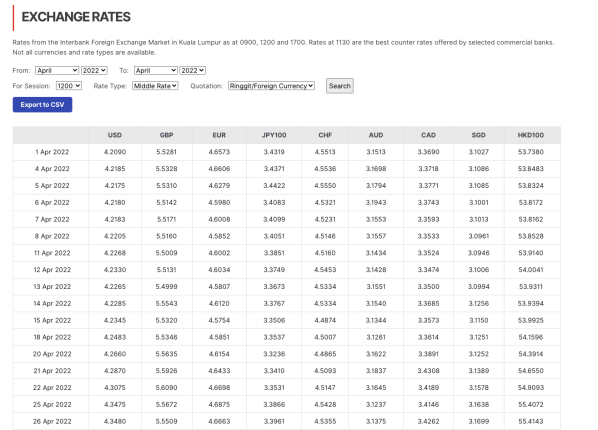
<WikiFX Malaysia Original: Editor – Fion>
The U.S. dollar maintained its gains due to the accelerated interest rate hike by the Federal Reserve coupled with the upcoming discussion of a 50 basis points hike in Mays Federal Open Market Committee (FOMC) meeting. Consequently, this drove the currencies of emerging markets to depreciate while Malaysia is no exception. As of writing, the USD/MYR pair to fall below the key level of 4.35 and the MYR recorded a 5-year low against the Singapore dollar as it fell to 3.169.

Data extracted from the Central Bank of Malaysia official website
However, the Ministry of Malaysia seems unphased with the weakening Malaysian Ringgit. He asserted that the ringgit is still competitive and inflation is under control despite headwinds from global geographical tensions and uncertainty because Malaysia has a strong balance of payments position including a healthy current account surplus and net external creditor status.
Furthermore, Malaysia‘s fundamentals remain strong, as evidenced by export growth and competitiveness, ample foreign exchange reserves, and low inflation compared to other countries in the region, all of which are expected to cushion the ringgit’s decline. The ministry stressed that the depreciation of the ringgit was linked to the general weakness of major and regional currencies.
As for inflation, the Ministry of Finance said that the price control policies implemented by the government, as well as subsidies for RON95 petrol and various food items will protect the people from further inflationary pressures.

Chief Economist of the Central Bank of Malaysia (BNM), Mohd Azhan Nijan, stated that Malaysias inflation could remain steady with the Consumer Price Index (CPI) remaining at 2.2% in March and the BoM is capable of keeping the Overnight Policy Rate (OPR) on hold in the near term. Hence, inflation in Malaysia is expected to be kept under control between 2.2 – 3.2% this year (2.5% in 2011), which is relatively lower than other ASEAN countries.
Next, the Ministry of Finance also highlights that his department will continue to work with the BNM to monitor both the financial and non-financial risks that could potentially impact Malaysia‘s economy, which include recent geopolitical tensions, and their impacts on global supply chain issues that could lead to increased inflationary pressures and volatility in Malaysia’s foreign exchange and financial markets.
The BNM will also always ensure that it has sufficient hot money to facilitate the smooth operation of the domestic foreign exchange market in order for businesses to execute trades and carry out investment transactions with greater confidence.
<WikiFX Malaysia Original: Editor – Fion>

Leave a Reply